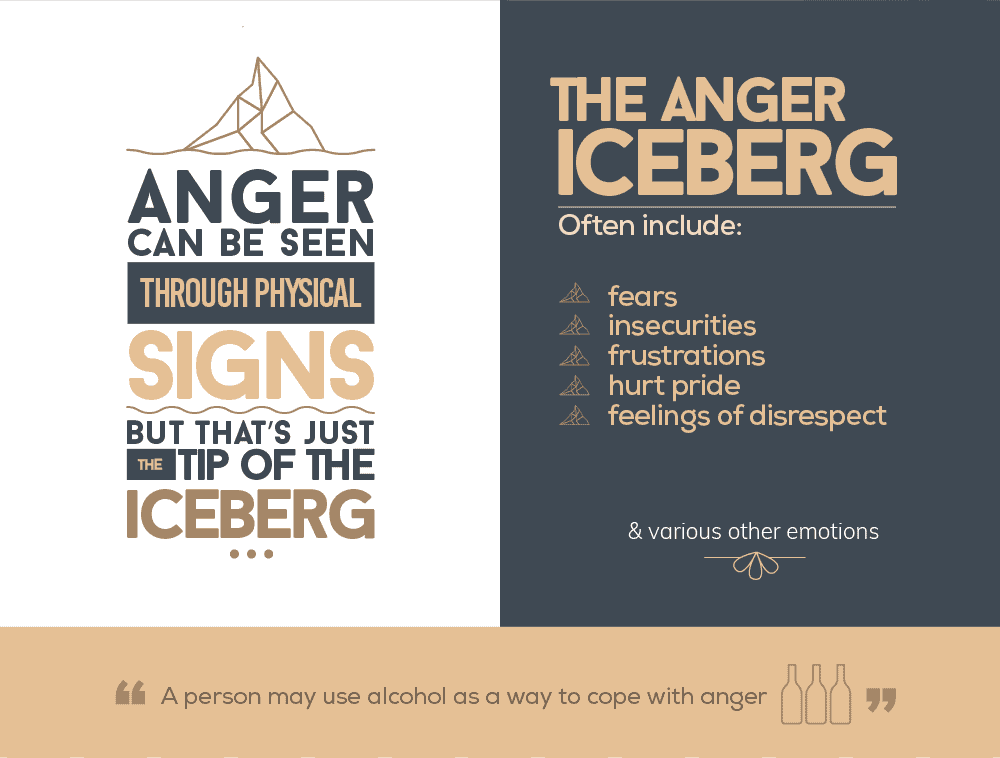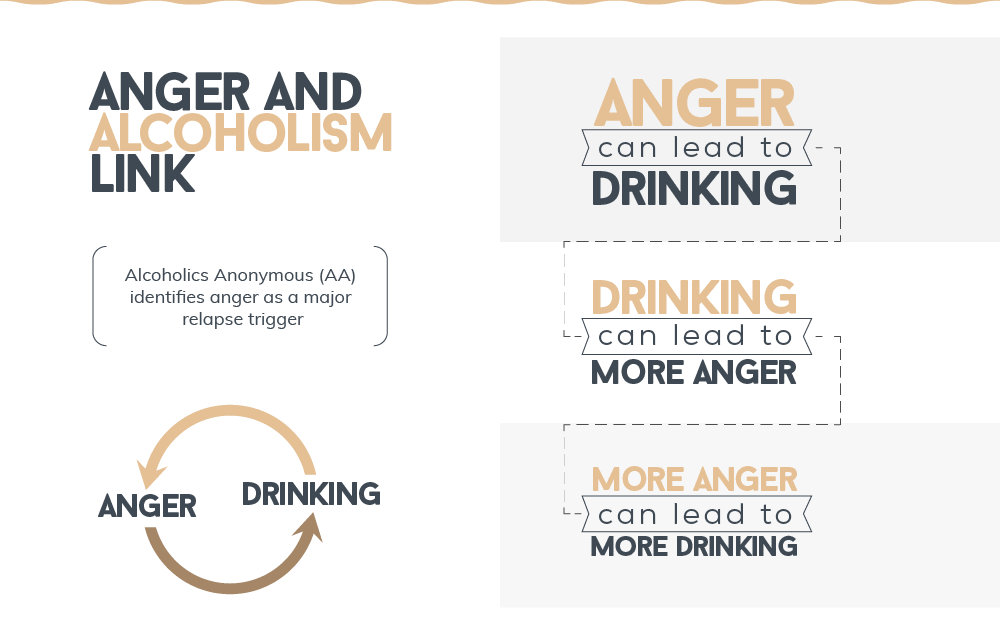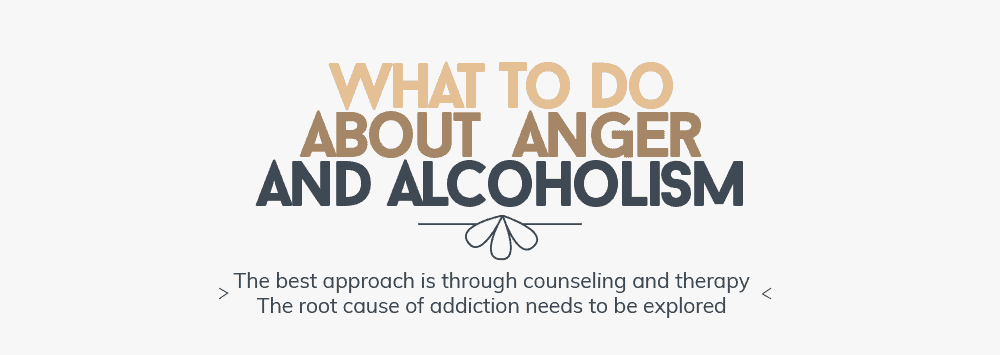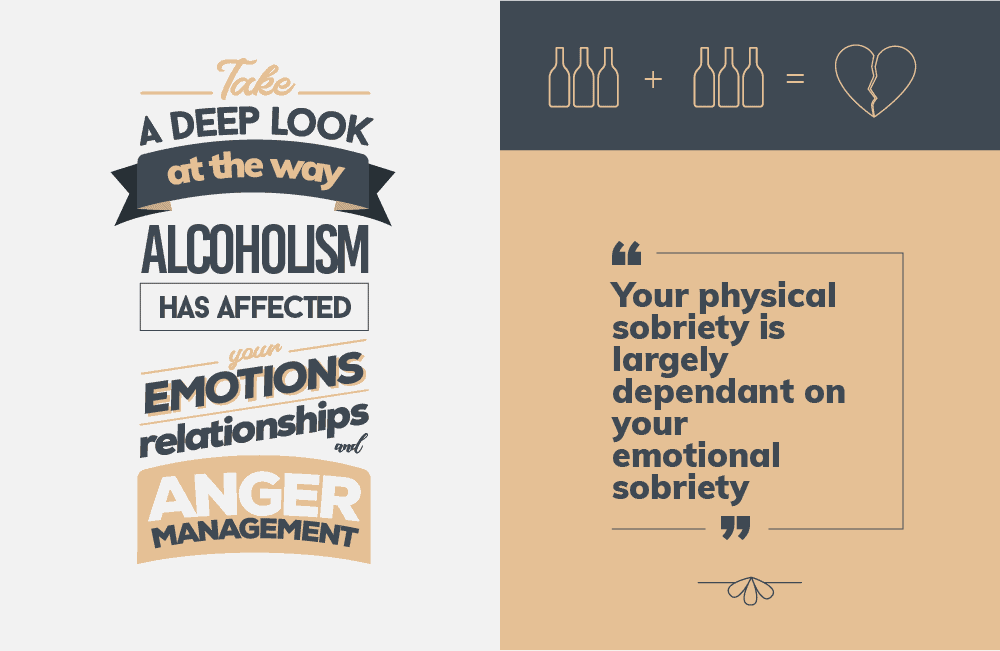“You will not be punished for your anger, you will be punished by your anger.” ~ Buddha Feeling anger is part of being human. It’s an integral (and sometimes necessary) human emotion. From toddlers to old men, everyone experiences anger from time to time. But taken too far, anger can make existing addictions worse – and even become a drug of its own. Anger can often turn into a coping mechanism. It can be used to avoid other issues, emotions and experiences – like the abuse of alcohol. The difference is using anger in this way is a ‘skill’ that people develop over decades of practice. If this form of anger goes unaddressed, it can be detrimental to your mental health and your relationships. Combined with alcoholism, it can be very dangerous to your physical health as well. The connection of anger with alcoholism is like a cycle. One allows you to escape from your other emotions, while the other allows you to escape further into anger. In a phrase, anger and alcohol abuse can feed off of each other if they both go unchecked. In fact, letting go of the acknowledging and dealing with anger is a crucial aspect of the Twelve Steps from Alcoholics Anonymous. The program requires that participants take a moral inventory of themselves, and attempt to overcome character defects. These are the issues that we jump into in this deep dive into the link between anger and alcoholism. This is a critical topic, and we want to handle it with care. The good news is, you can find help for both your anger and your alcoholism. “Gathering your power before you respond to anger takes awareness and restraint. Admittedly, it’s hard to surrender the need to be right in favor of love and compromise. It’s hard not to attack back when you feel attacked. But, little by little, surrendering these reflexive instincts is a more compassionate, evolved way to get your needs met and keep relationships viable if and when it’s possible.” ~Dr. Judith Orloff As Dr. Orloff points out, overpowering anger is extremely difficult. The same goes for alcoholism – and overcoming both of them at the same time can seem daunting. But is not impossible. With the right kind of help, you can put anger and alcoholism behind you and move toward a happier, healthier life.
“Get the help you need today. We offer outpatient assistance, so you can maintain your work, family, and life commitments while getting the help you deserve!”
Instead of throwing a brief blog post up here that barely touches on the main points, we have put together an in-depth guide to the reciprocal relationship between alcohol and anger. The main questions we address here include:
- What causes alcoholism? What causes anger issues?
- How do you deal with alcohol and anger outbursts?
- What is the last and most crucial step in the treatment of alcoholism?
- Why is dealing with anger and relationships such an important part of the Alcoholics Anonymous’ 12 Step Program?
- What are the symptoms of anger issues to look for? How do I know if this is linked to alcoholism?
- What is the anger iceberg?
- What is the best way to deal with a spouse or loved one who is dealing with both anger and alcoholism?
- How can I find help for my alcoholism and anger issues?
We want this guide to help you address the anger issues or alcohol abuse in your life – or in the life of someone you know and love. If you still have questions after reading through this post, do not hesitate to contact us today.
The Anger Iceberg: How Emotions Affect Everything, Including Alcoholism
Understanding how anger and alcoholism are linked requires understanding how emotions play into human biology. Not only that, but we have to learn the role of anger and other emotions in our personal lives and relationships. This is where both alcoholism and anger can have the biggest negative impact, if we’re not careful. “Emotions are, in essence, impulses to act, the instant plans for handling life that evolution has instilled in us.” ~Daniel Goleman One way to understand how anger connects to the rest of our emotions and experiences is to think of it as an iceberg. Check out Kyle Benson’s insight on the topic: “Think of anger like an iceberg. Most of the iceberg is hidden below the surface of the water. Similarly, when we are angry, there are usually other emotions hidden beneath the surface. It’s easy to see a person’s anger but can be difficult to see the underlying feelings the anger is protecting.” ~Kyle Benson, The Gottman Institute When someone is angry, other people are able to see the signs – such as the look in their eye or a raised voice. However, this is just the part that people are able to see. IN reality, there are often other emotions hidden under the surface. These emotions can include grief, fright, shame, embarrassment, annoyance, disrespect, disappointment, discomfort, regret, worry, envy, anxiety, insecurity, etc. The point is that anger very rarely stands on its own. This can also go a long way toward explaining the connection between anger and alcoholism. Someone who is struggling with alcohol addiction has lost control over their actions, which in turn can make them feel the shame, frustration or embarrassment we mentioned above. They may even feel depressed about their alcohol abuse or disappointed in themselves. These feelings often surface as anger. The reverse is also true: someone feeling a great amount of anger may turn to alcohol as a form of relief. Over time, the alcohol only serves to reinforce the internal anger they are feeling. This is why physical and emotional sobriety are often considered two sides of the same coin. “Anger icebergs often include fears, insecurities, frustrations, hurt pride, feelings of disrespect, and various other emotions. Given that it is usually quite easy to see a person’s anger, but difficult to see the underlying issues, the task of helping a person reduce his or her anger often takes a bit of detective work. The best way to control anger is to ask, “What is making me feel this way?” When the person examines his or her feelings that cause the anger, then the problem can be addressed.” ~Buck Black, LCSW In the example that Benson gives, the man experiencing anger recognizes that he doesn’t like the way he responds to those around him – but he is unable to stop until he recognizes where his anger is coming from. With this in mind, those struggling with both alcoholism and anger issues will do well to address the consequences of their alcohol addiction and what they can do about it. In the same way, if someone you love is exhibiting anger, you may want to dig deeper to understand where the response is coming from in the Anger Iceberg.
“We treat both addiction and co-occurring disorders and accept many health insurance plans. Take a look at our outpatient program today!”
Learn More: Watch Gottman Institute’s Kyle Benson discuss the Anger Iceberg on YouTube. Benson bases the video on the idea that overcoming anger requires recognizing that all individuals are capable of and deserve compassion, with the goal of creating greater love and health in relationships.
The Link Between Anger and Alcoholism is a Two Way Street
The Anger Iceberg starts to explain why the link between anger and alcoholism is a two way street. However, it is has a lot to do with feeling anger outside of being intoxicated. How does the connection between anger and alcoholism take shape while someone is drinking or when someone is tempted to start drinking again? For starters, consider this research insight from one government source: “Alcohol can have a disinhibiting effect and can also be used as an excuse to explain one’s behavior. During the later stages of dependence, alcohol can cause a decrease in the neurotransmitter serotonin. Most significant from a psychological or psychiatric perspective is the relationship between serotonin and depression, sleep regulation, aggression.” In other words, the relationship between alcoholism and anger is more than just perception. Alcohol actually affects the brain in a way that decreases our ability to control our actions and our emotions. The loss of inhibition can cause us to lose control over our anger. This is why anger tends to come out more when you’re drunk than when you’re not. The link between anger and alcoholism is often complicated. By way of a summary, there are several indicators of the reciprocal relationship between anger and alcoholism:
- Alcohol can serve as an excuse for aggressive and angry behavior
- Alcohol induces tunnel vision, which can make anger a more common response
- Aggressive behavior after drinking alcohol is more socially acceptable
- Alcohol reduces the fear of facing the consequences of anger and aggression
- Alcohol impairs your brain’s functioning, which makes controlling anger difficult
Because of these intertwined factors, Alcoholics Anonymous has identified anger as a major culprit for relapse in alcoholics. The co-founder of AA Bill Wilson wrote in the Big Book: “Resentment is the number one offender. It destroys more alcoholics than anything else.” If you’re looking for a more personal account, consider this perspective from recovering alcoholic and alcoholism counselor Thomas B on AA Beyond Belief: “Resentment and anger, ofttimes apoplectic rage, have dogged me throughout my forty-three years of recovery. My resentment and raging behavior have resulted in abundant negative consequences — lost friendships, lost jobs, lost wives and lovers, lost esteem and reputation. I’ve often been as powerless over resentments and raging anger, as I know I would be over alcohol were I to take the first drink.” This personal account highlights just how important it is to deal with anger issues. If you struggle with both addiction and anger, you should consider addressing both simultaneously. Read More: Anger May Stem from Alcohol and Other Drugs
“We accept many health insurance plans. You can get your life back in order with our outpatient program today!”
Understanding Anger: Dealing With Anger and Alcoholism in a Loved One
Alcoholism almost always affects those closest to the person struggling with addiction. This is doubly true when anger issues enter into the mix. It can be difficult to know how to deal with an angry alcoholic, particularly when they are close to you. There often extreme anger issues and internal anger to deal with, as well as the fact that there is pronounced anger when drinking. Whether this anger is aggressive or passive, it can have a negative impact on relationships. This is why it is so important to seek out help. It is also important to remember that anger management and alcoholism recovery takes a lot of hard work. If this describes someone you know and love, you should know that help is not out of reach. Therapy and family programs can help everyone work toward a happier and healthier relationship. If you have a spouse or loved one that struggles with both anger issues and alcohol addiction, here are a few suggestions to help you keep a handle on the situation:
- Remember the power of alcoholism. Alcoholism is a disease, pure and simple. Your loved one may be at the point where they have lost control over their drinking – which in turn means they have lost control on their anger. This doesn’t mean that they cannot overcome alcoholism, but it recognizing it as a disease is a good starting point.
- Don’t get angry yourself. Responding to anger with anger is a common – and understandable – response. Do everything that you can to avoid responding to a bad temper with a worse temper. This won’t accomplish your goals of getting your loved one the recovery help that they need.
- Focus on self care. If your spouse is angry or drinking all the time, they may not be taking care of you. Make sure you treat yourself and take the space and time you need to cope with your loved one’s condition.
- Find an appropriate way to talk about it. You don’t need to hide your feelings; it’s important to be honest with your loved one about the effect their alcoholism and anger is having on you. But you should make sure you do it in the right way – avoid accusations and make ‘I’ statements. And make sure you have this conversation when your loved one is in the right state of mind.
- Encourage professional help. Not everyone is open to therapy or rehab for alcoholics. If your loved one seems open to the idea, you can encourage them to follow through on a program.
What To Do About the Link Between Anger and Alcoholism
So far, the link between anger and alcoholism is crystal clear. Anger may lead you to drink more than you should, and drinking heavily can cause your anger to worsen. If this cycle goes unaddressed, it can have long lasting consequences for you and those around you. There are a handful of ways to start addressing both your anger and your drinking, but the number one solution is to seek out professional help. “If you don’t deal with your anger problem, it could one day escalate to a point where you do something extreme and regrettable. Violence is one possible outcome. You could get so angry that you end up hurting yourself or someone you care about without intending to do so. If you suspect you have an anger problem, it’s important to seek professional help.” ~Healthline, ‘Why Am I So Angry?’ Mayo Clinic lists 10 suggestions to tame your temper when you start to feel it flare up. These suggestions are not specific to those dealing with alcoholism and anger simultaneously, but they will undoubtedly help as you begin recovery:
- Think before you speak.
- Once you’re calm, express your anger.
- Get some exercise.
- Take a timeout.
- Identify possible solutions.
- Stick with ‘I’ statements.
- Don’t hold a grudge.
- Use humor to release tension.
- Practice relaxation skills.
- Know when to seek help.
“Asking yourself, ‘What might I be scared of?’ can give you a different set of choices about how to respond. You might be angry that something has not gone your way. But you may also be scared that you might be blamed or hurt as result. Recognising this might allow you to think and act differently.” ~Dr. James Woollard
Addressing the Connection Between Anger and Alcoholism at the Same Time
If this guide has revealed anything, it’s that the link between anger and alcoholism should be taken very seriously. If you find that that you are unable to control your drinking, your anger or neither – it may be time to seek out professional help to address these issues. The best way to approach getting help is either through support groups or individual addiction counseling. Both will help you explore the root causes of addiction and anger. Thankfully, there are a wide range of options when it comes to seeking out help for both anger issues and alcohol addiction. “If you feel that your anger is really out of control, if it is having an impact on your relationships and on important parts of your life, you might consider counseling to learn how to handle it better. A psychologist or other licensed mental health professional can work with you in developing a range of techniques for changing your thinking and your behavior.” ~American Psychological Association First and foremost, you should consider seeking professional help for alcoholism and anger issues. Both inpatient and outpatient programs for alcoholism addiction provide a supportive and safe environment for overcoming the grip of alcohol on your life. But these programs do not address only addiction – they also often offer counseling services to talk through your issues with anger. More than anything, a rehab program can help you create ways to deal with both alcoholism and anger. Even if you’re not ready to attend a more formal alcoholism rehab program or one-on-one counseling, it is a good idea to start attending an AA community support group. These groups are designed to help those struggling with alcohol addiction overcome the consequences of their condition – including being able to control their angry responses. AA meetings are typically open to anyone who wants to attend, and offer a nonjudgmental and supportive environment to talk through the effects alcoholism has had on your personal life. It may be a great first step on the path to addressing how alcoholism has made you angry – and vice versa.
Getting Professional Help for Anger and Alcoholism
“For every minute you remain angry, you give up sixty seconds of peace of mind.” ~Ralph Waldo Emerson Understanding an alcoholic’s mind or dealing with signs of repressed anger are not easy tasks. The road to recovery from anger issues and alcoholism is sure to be filled with internal rage, fits of anger, disappointment and many of the symptoms of anger and alcoholism we’ve discussed above. But dealing with these issues is critical to leading a healthy life. As Ralph Waldo Emerson points out, do you really want to give up your peace of mind for anger? Read More: Mental Health and Addiction – How a Co-Occurring Disorder is Treated Overcoming these issues of alcohol and anger is not impossible. Ashwood Recovery is committed to helping families and individuals in crisis. Whether you are suffering from alcoholism, mental health disorders or unresolved trauma, we are here to help. Our vision is to provide a safe, non-judgmental environment for those seeking solutions to alcoholism or anger issues. Ashwood Recovery at Northpoint is an outpatient treatment center located in the Boise, Idaho area. At our facility, you can receive treatment for co-occurring disorders, receive individual alcohol counseling and even participate in family counseling. Alcoholism comes in many different forms – getting angry with those closest to you is just one example. No matter what form your alcoholism has taken, we can help you address the consequences and get on the path to recovery. Not sure if you’re addicted to alcohol or anger? No one thinks he or she is an alcoholic until it’s too late. Take our alcoholism quiz today to find out if you need professional help. Choosing Ashwood Recovery at Northpoint gives you the freedom to address your alcoholism or anger issues while maintaining your daily responsibilities. If you have more questions about the link between anger and alcoholism – or what treatment looks like – do not hesitate to contact us today.
What Did you Think About This Blog?
Give it a Rating!
[kkstarratings]






